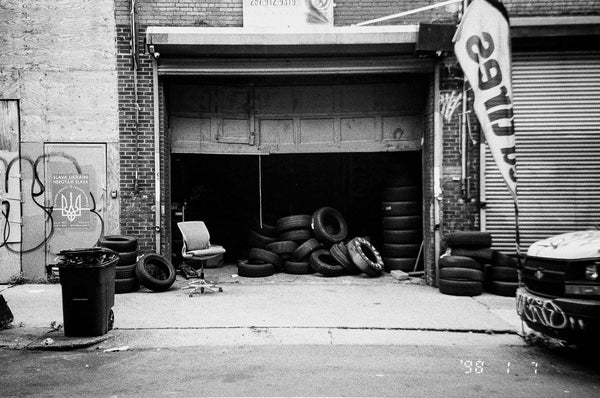Eric Schaeffer is a regular Film Club Member and the images we have seen on his Instagram inspired us to reach out and interview him for this week’s Member Moment feature. Scroll down to see some of his photos and read our interview with him.



PL: What got you interested in film photography?
ES:I first started shooting film when I took film photography in college. I was obsessed with shooting black and white 1600 ISO, high contrast, dark blacks with a lot of grain – gritty looking images. But once I graduated I was doing mostly cinematography and working on films. After a while, I came across some childhood photo albums that my mom had shot on mostly disposable color cameras from the 90s and early 2000’s, which was what ultimately made me go buy a film camera to start shooting with again.



PL: What type of camera do you shoot with, and what kind of film do you usually use?
ES: I shoot with disposable cameras, a 1999 Konica Z-up 60, 1989 Canon Snappy-Q, 1985 Minolta Freedom 65, all point and shoot cameras. I also have a Canon Rebel 2000 that I keep a roll in at all times. I bought it with 15 rolls of 25-year expired film, which is fun to shoot on, but with the point and shoots you need a lot of light because you can’t adjust anything. On a day-to-day basis I’m shooting Ilford HP5 plus 400, Delta 3200, or Portra 160.



PL: There are a mix of color and black and white images within this collection. What are some qualities that you like about both?
ES: I started with black and white. The photography I like best is black and white, so I tend to use it most. But recently I bought some Portra 160 (color film) and it blew my mind. It reminded me of the first time shooting 16mm color film on a Bolex, it’s just very true to real life. So in the future I’m going to be mixing in more color depending on what I’m shooting.



PL: Some of your photos capture people in candid moments. What do you like about photographing people? What is challenging about it?
ES: When I am freelancing with a digital camera and a long lens, everyone is aware they’re being photographed, which subconsciously prohibits people from acting fully natural. The best photos are the ones in which people feel like they aren’t held responsible for their movements, so I always carry a small-body automatic film camera to capture those in-between moments when people are being themselves. No sunset, mountain, or perfectly framed cityscape is better than a photo of someone in their element being true to themselves.



PL: What are some of your goals for your photos? What do you hope people will take away when they look at your photos?
ES: A lot of my freelance jobs are shot on my digital cameras and my personal life is shot on film mostly because of accessibility and cost . In the future I’d like to not separate the two as much and shoot more film for the people who trust me to capture them. When people look at my photos I hope that they feel something, whether that’s a positive or negative emotion. You know when there is a stack of prints at a vintage store and you buy a random photo for whatever reason? Fully based on instinct… I want to take those kinds of photos.



PL: Out of all of these images, which is your favorite and why?
ES: The image of the two girls riding bikes is my favorite. My friends helped my girlfriend and I move all day long, and in that photo we had just finished and were riding to the park to have a few beers. It's relief, happiness, fun, and the photo itself looks fast. I like how it’s not preconceived; it captures a moment in a way where the visual aspect of the photo mirrors how the in-person moment felt perfectly. That’s what I am trying to do every time I take a photo.


_______________________________________________________________________________________________________________________________________
Every day, Club Members take exceptional pictures. If you are not a Film Club Member yet what are you waiting for? Join today to support the photo community in Philly and to start saving money on film processing!
